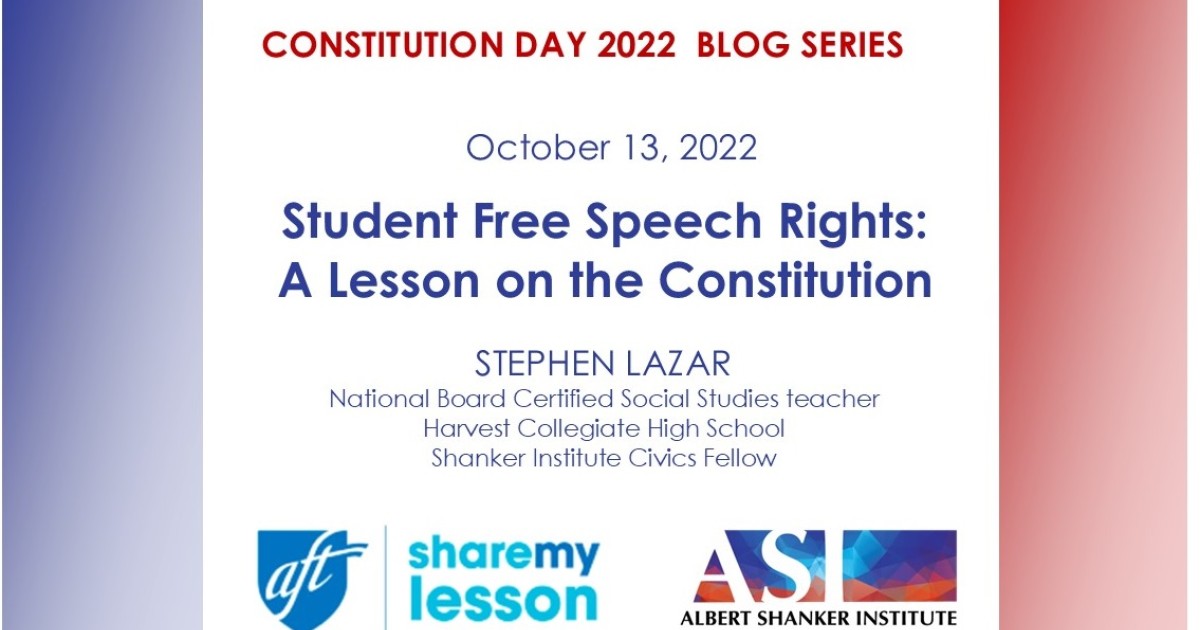In the fourth blog of our Constitution Day 2022 series, guest author Stephen Lazar, a national board certified teacher and a Shanker Institute Civics Fellow, uses his students’ natural interest in their free speech rights in school as an opportunity to teach them about the Supreme Court’s role in helping to redefine and enhance the rights enshrined in the Constitution’s Bill of Rights.
I always tell my students that (other than the Dred Scot case of those of a similarly evil tilt) Hazelwood v. Kuhlmeier is my least favorite Supreme Court Case, as it’s the only one that’s ever been used against me. I was editor-in-chief of my high school paper and was set to publish two op-eds that were critical of the school. The Hazelwood case enshrined a limitation on students’ freedom of speech in school-sponsored publications, deeming them school projects that therefore are subject to complete editorial censorship by the school administration. Our advisor took the critical pieces to our principal, who told me I could not run one of them and had to make edits to the other, that I had written.[1] I was livid, but swallowed my pride.
Over two decades later, when I teach students about their free speech rights in school, my primary aim is to help them embrace and understand the rights they do have in school—particularly for political speech—as well as the fact that their free speech rights are not absolute.
Students’ natural interest in their free speech rights in school yields an ideal opportunity to help them understand how the Supreme Court works and its role in helping to redefine and enhancing the rights enshrined in the Constitution’s Bill of Rights. While I’ve used these cases for years, they came alive for my students seven years ago after adopting the Moot Court procedure my then co-teacher, Nitzan Ziv, had developed at her previous school. The lessons embed students’ experiences of learning about their free speech rights within the process of preparing to argue a fictional case involving student speech as lawyers or deciding the case as justices.
I’ve published the lessons and resources on Share My Lesson as part of the Albert Shanker Institute’s Civic Fellows initiative. In addition to focusing on the important content knowledge and dispositions that are necessary for active participation in democracy, these lessons also emphasize key approaches to civic learning: knowledge with skills; the power of deliberation and controversy; equitable civics, and teaching through Inquiry Learning. My Student Free Speech lesson emphasizes knowledge with skills, as it helps students learn about key historic Supreme Court cases while practicing the key skill of argumentation. It focuses on a potentially controversial issue regarding student speech in school and supports students in engaging with it by wearing the hat of lawyers and Supreme Court Justices, which helps them practice a responsible and mature form of engagement on the issue. Learning supports and differentiated roles within the moot court help make this equitable for all learners. Finally, the lesson is an inquiry focused on the question, “Can you say what you want in school?”
Through this inquiry, students learn about the idea of precedent by studying three key Supreme Court decisions on student speech: Tinker v. Des Moines, Bethel v. Fraser, and Hazelwood v. Kulhmeier. The materials on the historical cases were adapted from Street Law’s Landmark Cases curriculum.
Once students understand these key precedents, students are ready to prepare to construct arguments or render a verdict in a fictional Supreme Court case that imagines a student using the once-popular “I ♥ boobies” bracelets within a school project after they are banned by the school for leading to sexual harassment. The fact that they are used in a school project brings Hazelwood into the fold, their origin as political speech requires students to grapple with the meaning of Tinker, and their use in sexual harassment evokes the Fraser case.
The day of the moot court case in our classroom is always memorable. Students come ready to passionately argue their side and justices are ready with provocative questions. Depending on their role, students who are lawyers submit written briefs in advance, or students who are justices submit written verdicts afterward. They leave with a strong sense of how to advocate for the rights they do have, as well as a much better understanding of what the Court does which prepares them for moments both celebratory and mournful when the actual Supreme Court announces their decisions at the end of the school year.
[1] My piece called on the school to support teachers who wanted to take less traditional approaches to teaching and learning. Though I didn’t know it at the time, I was arguing for many of the progressive principles laid out by Ted Sizer and the non-retired Coalition of Essential Schools. My much-loathed English teacher at the time, Mrs. Reed, wrote a letter to the editor calling my piece, among other things, “naïve and didactic.” It was encountering the views of Sizer in college that made me want to become a teacher, in some part because I knew if I became a teacher there would be one less person like Mrs. Reed in the classroom. A dozen years after this, I would help found Harvest Collegiate High School on those same Coalition principles, where I still teach.



More Stories
Maverick’s Fighter Jet Stunts Push the Boundaries of Physics
Women’s History Month 2022: An Interview with Jennifer Thompson
You Might Be Surprised to Learn That the First ‘Top Gun’ Is Actually Pretty Realistic